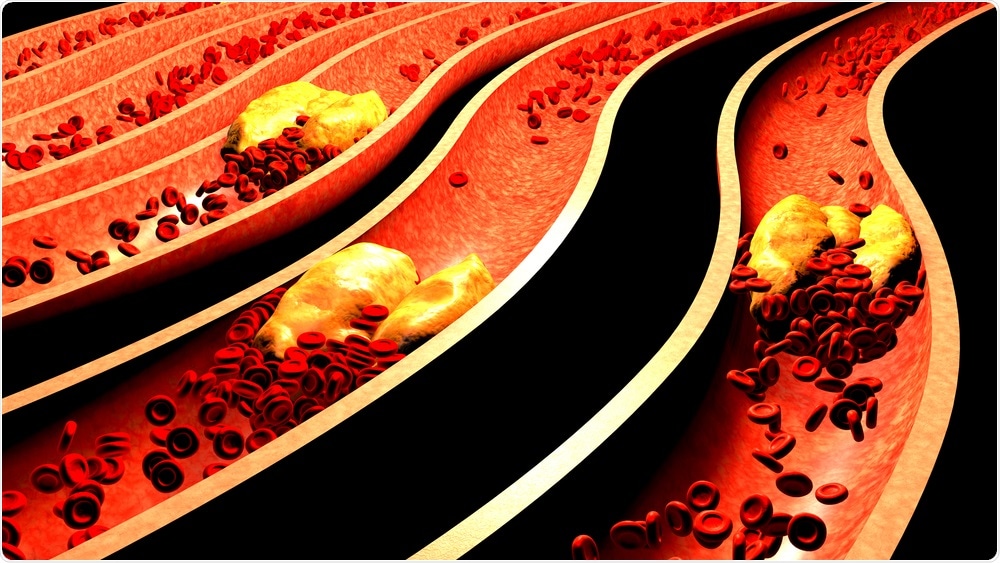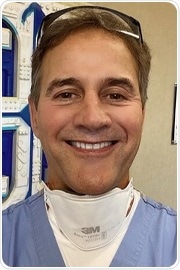Dr. James H O'Keefe speaks to AZoLifeSciences about his latest health research that investigated the pesco-Mediterranean diet, and how this diet may lower the risk for heart disease.
Why did you choose to research the effects of diet on heart disease? Why is having a good diet so important to human health?
Next to our interpersonal relationships, diet is arguably the most important factor in determining one’s long term health and life expectancy.

Image Credit: Foxys Forest Manufacture/Shutterstock.com
Why does the ideal diet for health remain such a dilemma for many people?
Because so many people enthusiastically endorse diets that have never been proven in scientific studies to optimize health and longevity. And many people, including physicians and scientists, have a hard time being objective when it comes to diet.
What are the problems associated with veganism, and also for people that over-consume meat?
Vegans are at increased risk for osteoporosis (weak bones), sarcopenia (not enough muscle), anemia (low blood count), and depression.
On the other hand, the large numbers of the US population who overconsume meat, especially processed meats like hot dogs, bacon, sausage, and deli meats, place themselves at increased risk for colon cancer, pancreatic cancer, heart attack, and diabetes.

Image Credit: Foxys Forest Manufacture/Shutterstock.com
What does the pesco-mediterranean diet consist of?
- Extra virgin olive oil, high in polyphenol antioxidants instead of butter or margarine, or other cooking oils,
- Vegetables (especially leafy greens, cruciferous veggies, onions, garlic, and tomatoes) and fruits (especially berries)
- Nuts as the staple snack food instead of chips, candy, cookies, cakes, and other sugar-sweetened treats
- Fish and seafood as the primary animal foods. Eggs in moderation (< 5 yolks per week, egg whites are unlimited)
- Legumes and whole grains. No white flour or refined grain products
- Avoid processed foods and fast foods
- Water, coffee, and tea are preferred beverages
- If alcohol is to be consumed at all, it should be limited to red wine, not more than 6 oz/day for women and not more than 12/ oz/day for men
Can you describe why this diet helps to lower the risk of heart disease?
It lowers blood pressure and improves cholesterol. Furthermore, it reduces inflammation and helps to reduce plaque formation/progression in arteries.
What other benefits does the Mediterranean diet have on health apart from lowering the risk for heart disease?
Reduced risk of Alzheimer’s disease, diabetes, cancer, and obesity.

Image Credit: Ralwell/Shutterstock.com
In your research, you also looked at the impact of intermittent fasting on health. Can you describe your results here?
Fasting will lower inflammation, burn off belly fat, improve sleep, and may reduce the risk of heart disease and cancer.
Do you believe that by properly educating people on healthy diets, we can limit the number of people suffering from heart disease and other health conditions as a result of a poor diet?
Yes, it is one of the most important steps we can take to improve the health, wellbeing, and life expectancy of the US population.
What are the next steps in your research?
Test this diet in a large randomized trial of thousands of people followed for at least 3 years.
About James H O’Keefe MD
James H O’Keefe MD is Director of the Duboc Cardio Health & Wellness Center and Director of Preventive Cardiology at Saint Luke’s of Kansas City, Mid America Heart Institute. He is Co-director of the Haverty CardioMetabolic Center and is also a Professor of Medicine at the University of Missouri-Kansas City. His postgraduate training at the Mayo Clinic in Rochester, Minnesota included a cardiology fellowship and internal medicine residency.
Dr. O’Keefe is board-certified in Cardiology, Internal Medicine, Nuclear Cardiology, and Cardiac CT Imaging. Dr. O’Keefe has contributed approximately 400 articles to peer-reviewed journals, and his articles have been cited over 18,000 times in the medical literature.
He has authored best-selling cardiovascular books for health professionals including The Complete Guide to ECGs, which is used by cardiovascular fellowship training programs as the preferred teaching text for the ECG section of the ABIM Cardiology Board Certification Exam.
USA Today has listed Dr. O’Keefe among America’s Most Influential Doctors. He has recently launched an ECG teaching website OKeefe ECG, https://okeefeecg.com/